 Melissa Anderson
Melissa Anderson
Labor and love: Rainer Werner Fassbinder’s 1972 TV miniseries gets its first US theatrical run.
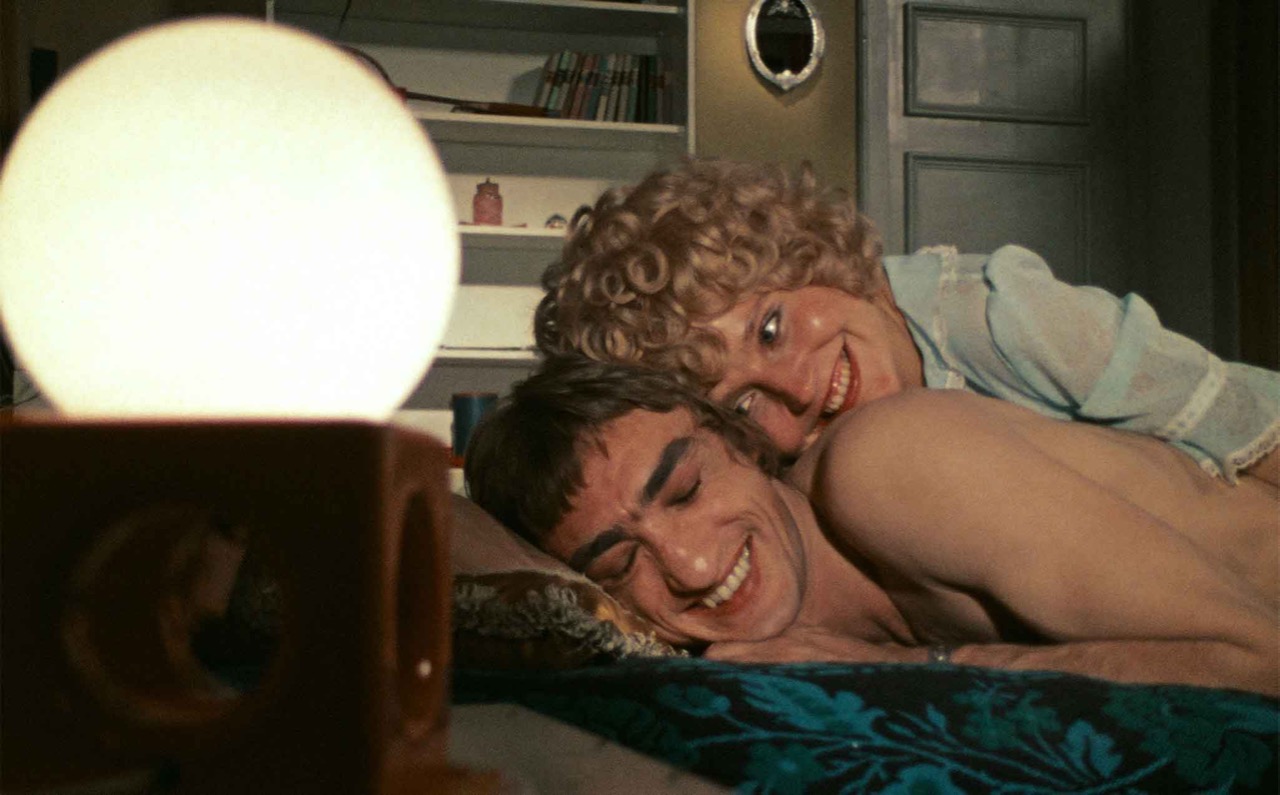
Gottfried John as Jochen Epp and Hanna Schygulla as Marion Andreas in Eight Hours Don’t Make a Day.
Eight Hours Don’t Make a Day, written and directed by Rainer Werner Fassbinder, Film Forum, 209 West Houston Street, New York City,
March 14–27, 2018
• • •
In early February, a symmetrical milestone in history was reached: the Berlin Wall (1961–89) had been gone for as long as it had stood. Another German icon—Rainer Werner Fassbinder (1945–82), the outrageously prodigious filmmaker, theater director, and actor—also achieves a (near) equinox in 2018. He has been dead for almost as many years (thirty-six) as he was alive (thirty-seven). Yet even from beyond the grave, Fassbinder, who made more than forty films over a fifteen-year span, still seems to be creating them and astounding audiences anew.
Or, more accurately, we are forever catching up with his enormous body of work; in 2010, for instance, RWF’s little-known sci-fi World on a Wire (1973), a future-tripping two-part TV movie about a cybernetics corporation, was rediscovered and played in cities throughout the US. Next week at Film Forum, an even greater Fassbinder find receives its premiere theatrical run in the States: the digitally restored proletariat paean Eight Hours Don’t Make a Day (1972). The first of several TV miniseries Fassbinder would direct—which also include the fourteen-chapter Berlin Alexanderplatz (1980)—the five-episode Eight Hours Don’t Make a Day stands as one of the most compassionate and optimistic works ever created by the New German Cinema godhead, an auteur best known for films that pitilessly exposed his country’s complacency and the cruel delusions of human attachment of any kind. (The title of his first feature, 1969’s Love Is Colder Than Death, succinctly describes RWF’s philosophy.)
Fassbinder began the four-month shoot of Eight Hours Don’t Make a Day, commissioned by the public broadcaster Westdeutscher Rundfunk, in April 1972 in West Berlin. The first steps of the WDR-RWF collaboration had been taken two years earlier, when one of the organization’s producers, Peter Märthesheimer—an admirer of Fassbinder’s second feature, Katzelmacher (1969), about the animosity aimed at a Greek laborer newly arrived to Munich—approached the filmmaker to write and direct an epic about a working-class clan and those in their orbit (the project’s subtitle is A Family Series).
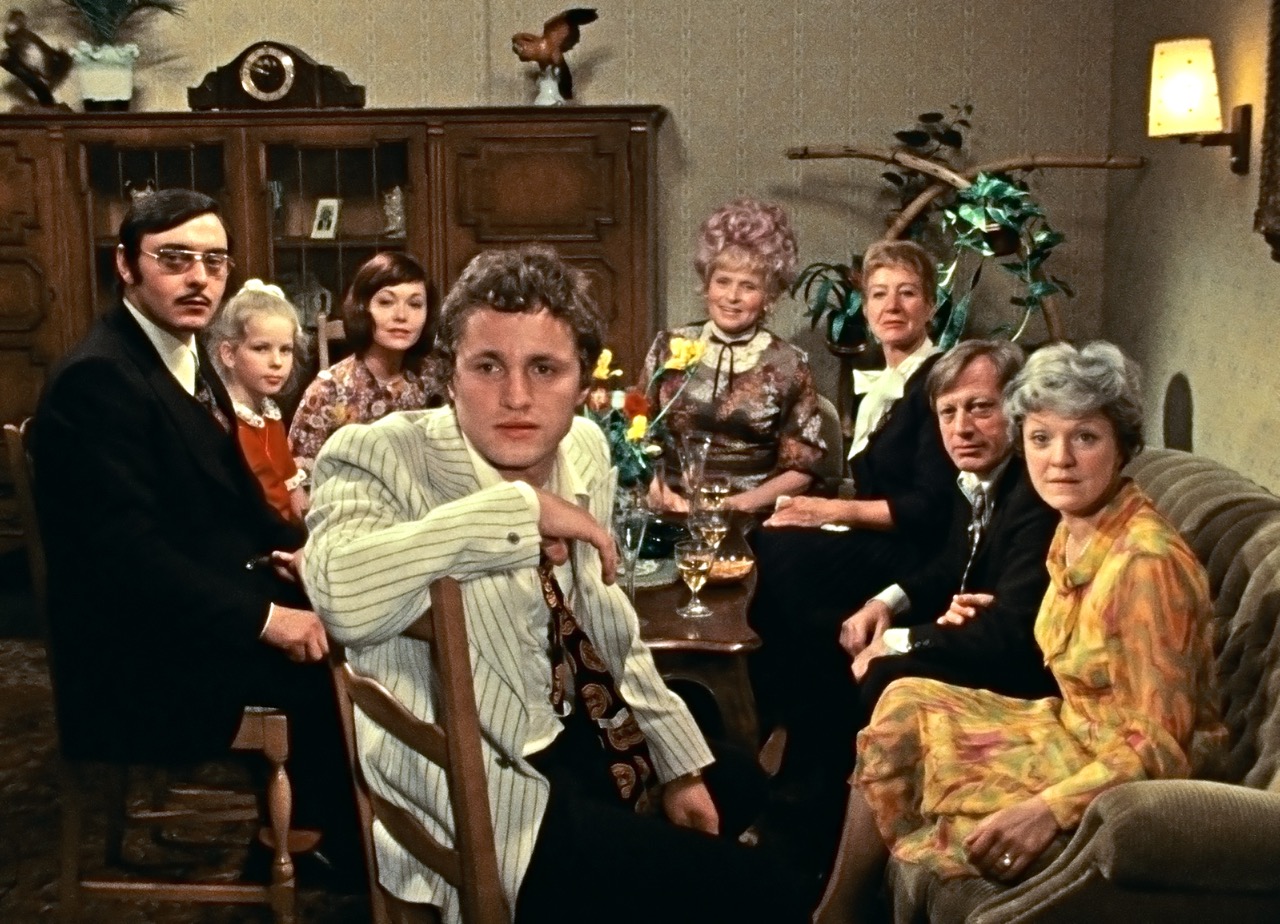
Luise Ullrich as Oma Krüger, Wolfgang Zerlett as Manfred Müller, Kurt Raab as Harald, Andrea Schober as Sylvia, Anita Bucher as Käthe Epp, Wolfried Lier as Wolf Epp, and Christine Oesterlein as Aunt Klara in Eight Hours Don’t Make a Day.
As RWF himself explained, the goal of the multipart drama (which, spritzed with slapstick and sight gags, is often very funny) was to upend “what people usually expect workers to be.” Fassbinder’s laborers aren’t doomed to abysmal lives: they are unalienated, committed to group action on the factory floor and to maintaining strong bonds with kin, lovers, and friends after punching out. The central figure of the expansive ensemble is Jochen Epp, played by Gottfried John, a lanky hulk with enormous facial features—his schnoz approximates the size of a beer stein—who suggests a Willy Brandt–era Adam Driver. An employee at a tool factory, he still lives at home with his parents and his beloved grandmother (Luise Ullrich); a birthday party for Oma (the German word for “granny” and the only name assigned to Ullrich’s character) opens the miniseries and introduces most of the principal cast.
That celebration also occasions the circumstances for a thrillingly strange romantic first encounter. Dispatched to buy more bubbly for Oma, Jochen, while feeding marks into a champagne vending machine, starts chatting with Marion (Hanna Schygulla), who’s purchasing pickles from a similar automat contraption: the meet-cute becomes the meet-cuke. Although they form a somewhat class-discordant couple—Marion is the daughter of a civil servant and works in the classified-ad department of a newspaper—she is frequently the first one to rousingly remind Jochen and the six other members of his tool-making team of their rights as organized labor.
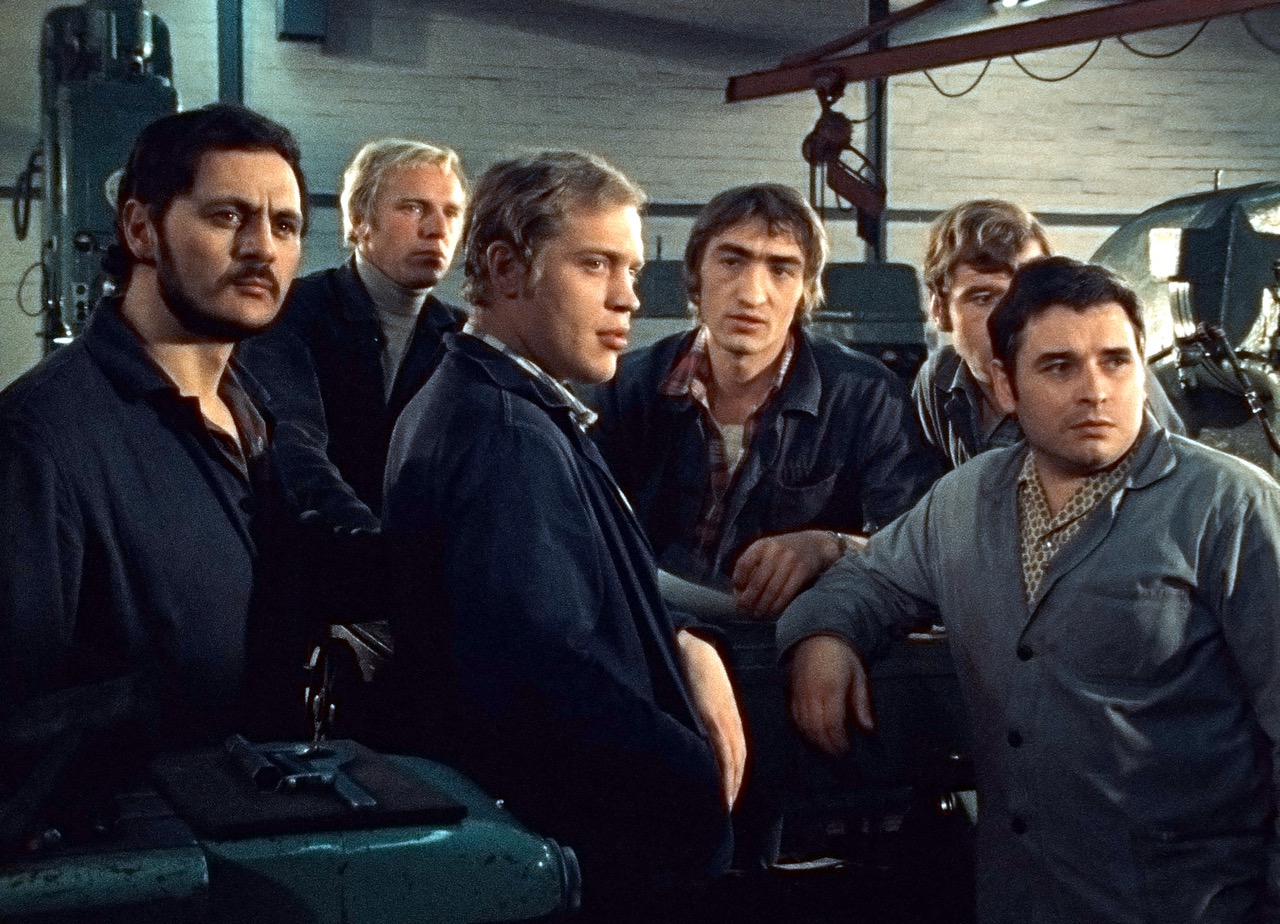
Gottfried John as Jochen Epp and Wolfgang Zerlett as Manfred Müller in Eight Hours Don’t Make a Day.
Marion’s punctilious officemate at the gazette, Irmgard (Irm Hermann), spends much of Eight Hours Don’t Make a Day sniffing at her colleague’s romantic choice—“I mean, strictly speaking, he’s just a worker”—but even she falls for a blue-collar guy. During an on-the-clock chat that occurs late in the series, Marion delivers perhaps the sweetest appraisal of coupledom ever heard in a Fassbinder film, one that intimates that a duo can also be a kind of collective: “You’re something great together, because you love each other.” The tender scene has a pleasingly dissonant buzz for those who recall Schygulla and Hermann—two of the performers most closely associated with Fassbinder—in his sapphic chamber drama of extreme emotional sadomasochism, The Bitter Tears of Petra von Kant, which premiered the same year that Eight Hours was filmed. (Many other paradigmatic actors from RWF’s troupe also appear in the miniseries.)
The hopefulness embodied by Jochen and Marion extends to other dyads as well—primarily gregarious Oma and her doting, slightly daffy fella, Gregor (Werner Finck), whom she first chats up on a park bench (he’s reading Lady Chatterley’s Lover) and immediately enlists in one of her many schemes to flout rigid Teutonic authority. The most ambitious of these plans results in a DIY daycare center, a venture that will allow at least some freedom for Jochen’s sister, Monika (Renate Roland), married to petty tyrant Harald (Kurt Raab), who insists his wife stay home with their young daughter. The utopian promise of Eight Hours extends across generations: the idealism espoused and practiced by Oma and Gregor and their charges at their kindergarten mirrors that found among Jochen and his tool-factory cohort.
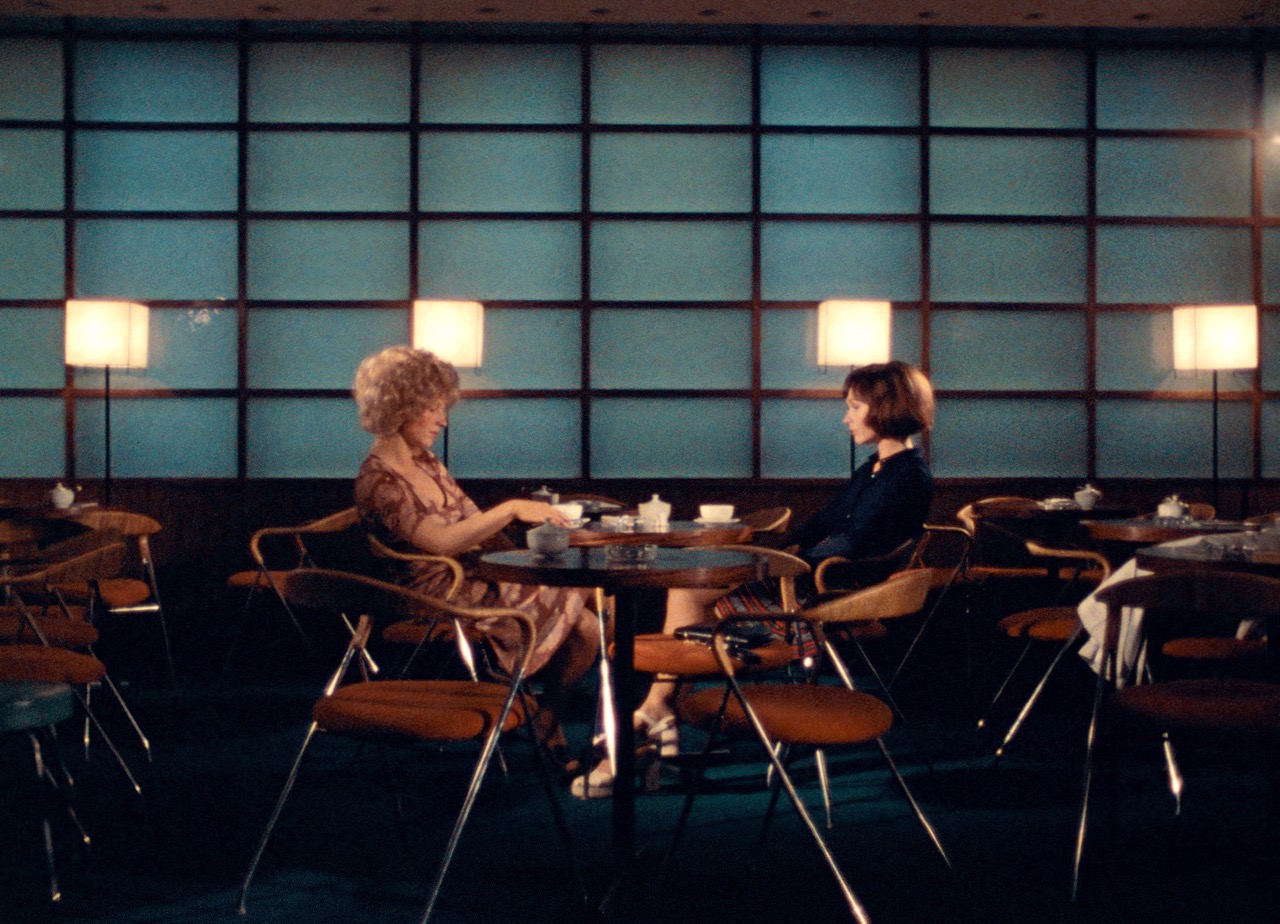
Hanna Schygulla as Marion Andreas and Renate Roland as Monika in Eight Hours Don’t Make a Day.
And speaking of mirrors, those glass surfaces so beloved by Fassbinder (as they were by his polestar, Douglas Sirk, whose luxuriantly hued 1950s melodramas provided a template that RWF tweaked with a more austere color palette and Brechtian distanciation) abound in Eight Hours; at one point, Jochen, after a bender at his favorite bar, walks into his own reflection. Mirrors are just one key element of Fassbinder’s typically impeccable mise-en-scène—compositions, like the arrangement of Marion and Monika in a café, that highlight the empathy (and occasional antipathy) provoked by each member of this fascinating constellation of characters.
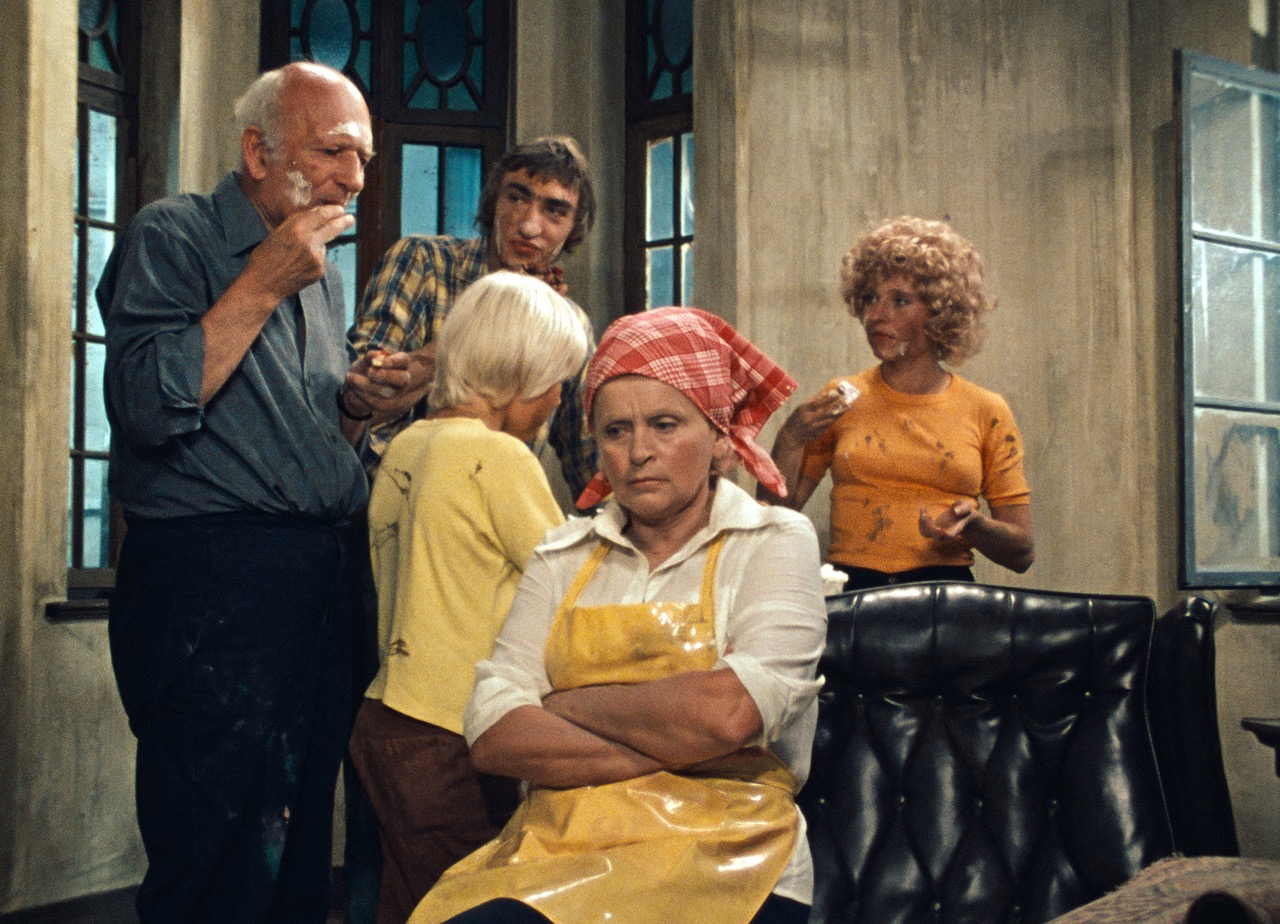
Gottfried John as Jochen Epp, Hanna Schygulla as Marion Andreas, Luise Ullrich as Oma Krüger, Werner Finck as Gregor Mack, and Thorsten Massinger as Manni Andreas in Eight Hours Don’t Make a Day.
Juliane Maria Lorenz—the president of the Rainer Werner Fassbinder Foundation and the artistic director of the 2K digital restoration of Eight Hours from the original 16mm—notes that the miniseries, broadcast in installments from October 1972 to March 1973, was largely panned by the West German press, which complained that it was “unrealistic in its optimism.” (In a 2011 piece for the Los Angeles Review of Books, Lorenz points out that German trade unionists had their own qualms with the series.) Speaking not only as a Fassbinder fan but as someone who recently served as a representative of a unionized work force locked in a brutal struggle with management, I found Fassbinder’s call for solidarity, however sanguine, an absolute tonic. Watching the miniseries requires steadfast commitment; the total running time is just a few minutes shy of the standard workday mentioned in the name. While the title is self-evident—“eight hours for work, eight hours for rest, eight hours for what we will,” as the labor slogan of the 1800s declared—it also contains a larger, paradoxical truth. The eight hours of Eight Hours Don’t Make a Day don’t make a day; they instead untether us, as all great art does, from any linear sense of time. They are a portal to another side of a pessimistic genius—and to another idea of what our wrecked labor practices could have been, and maybe still could be.
Melissa Anderson is the film editor of 4Columns. From November 2015 until September 2017, she was the senior film critic for the Village Voice. She is a frequent contributor to Artforum and Bookforum.